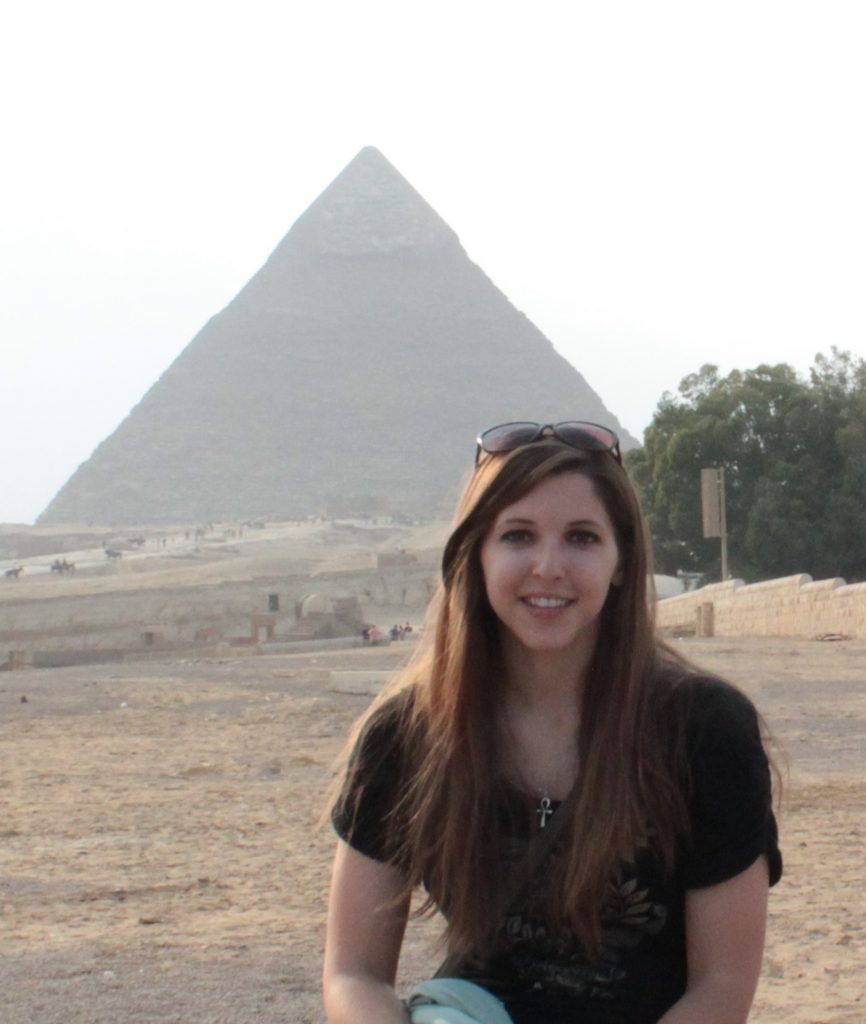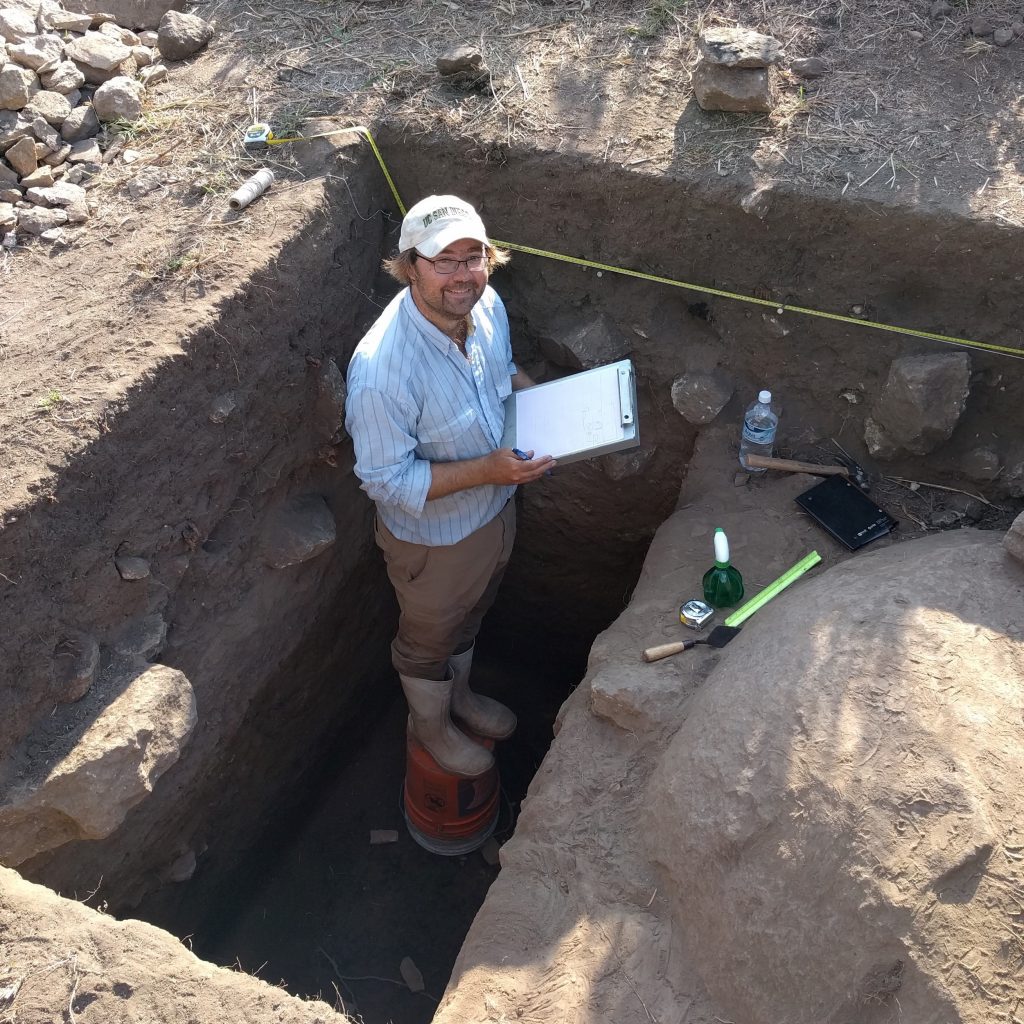
Danielle Candelora: Biography
Danielle Candelora is a Ph.D. Candidate in the Department of Near Eastern Languages and Cultures at UCLA. She studied both Aegean and Egyptian archaeology at Brown University as an undergraduate, then attended the University of Chicago to complete her Master’s degree at the Oriental Institute. Her Master’s thesis focused on the Minoan-style frescoes discovered in Northern Egypt at the site of Avaris, modern Tell el Dab’a. Her dissertation will build on this work, investigating the processes of identity negotiation at this site during a period of intense immigration from the Levant which culminated in the rule of the foreign Hyksos Kings in the Nile Delta. Danielle has excavated a Revolutionary War battlefield in New Jersey, a Roman fortress in Spain, a Crusader site in Israel, as well as a Greco-Roman settlement in Egypt. She aspires to pursue a career in academia while continuing to engage in public archaeological outreach.
Danielle Candelora: Project Summary
Danielle’s research is centered around the Hyksos, a small group of immigrant Levantine dynasts who ruled northern Egypt for about a century during a period of political fragmentation known as the Second Intermediate Period (ca. 1725-1550 B.C.E.). While the larger question of identity negotiation in the Second Intermediate Period is the subject of her doctoral dissertation, Danielle’s current project is two-fold. First, she seeks to better understand the title HqA xAswt (ruler of foreign lands), the ancient Egyptian term from which the word “Hyksos” is derived, investigating how these kings adopted an Egyptian title to advertise their foreignness and leadership from an Egyptian perspective. Second, she will be investigating technological transmission under these kings. While the Second Intermediate Period is characterized by the influx of numerous foreign technologies imported from the Levant (e.g., the chariot, bronze production, etc.), many scholars still propose that the Hyksos themselves acted as a block to the transmission of this specialized knowledge. Danielle will analyze the archaeological paraphernalia of these technologies in order to demonstrate that instead, the Hyksos acted as a conduit, drawing Near Eastern technologies into Egypt. Her research will be conducted at the Museo Egizio in Turin, Italy, which is the largest collection of ancient Egyptian material outside of Cairo. Turin is also home to the Turin King List, a highly fragmented papyrus and a contentious source for the Hyksos period, making Turin the ideal institution for this research. The AIA-OC grant will permit Danielle to contribute to a new image of the Hyksos by helping to elucidate the conscious and purposeful negotiation of their identities, as well as redefining the nature of their rule and their influence over later Egyptian society and language.

Mikael Fauvelle: Biography
Mikael Fauvelle received his M.A. in Anthropology from California State University, Northridge in 2010 and is currently a doctoral candidate in the Anthropology department at the University of California, San Diego. His research focuses on the role that regional and long-distance connections played in the development of complex political systems. He examines this issue on two levels, studying both hunter-gatherer societies from pre-colonial California as well as archaic states in Mesoamerica. In California, Fauvelle has focused on exchange systems in the Santa Barbara channel region, examining the role played by trade in plant, shell, and mineral resources on the development of coastal chiefdoms. He has argued that California and adjacent areas of North America were connected through intensive trade networks that played important roles in the area’s historical development. In Mesoamerica, Fauvelle has worked on projects in Guatemala, Belize, and Mexico. Since 2015 he has been the director of investigations at the site of Fracción Mujular, located on the pacific coast of Mexico in the state of Chiapas. At Fracción Mujular, Fauvelle has been investigating the relationship between coastal Chiapas and the famous Central Mexican city of Teotihuacan. Fauvelle is especially interested in how the influence of Teotihuacan during the Early Classic Period (circa 200-600 CE) affected the lives of non-elites at Fracción Mujular, and how the site’s relationship with Central Mexico changed following the collapse of Teotihuacan in the sixth century CE. Fauvelle has published his work in journals including American Anthropologist, American Antiquity, and the Journal of Archaeological Science.
Mikael Fauvelle: Project Summary
Located over 700 km away from Fracción Mujular, the ancient city of Teotihuacan was one of the largest urban centers to ever develop in the ancient Americas, reaching its height of population around 500 C.E. (Cowgill 2015). Teotihuacan influence has been identified at sites throughout Guatemala, Honduras and Belize, some located over 1000 km away from Teotihuacan’s center of power in the Basin of Mexico. The degree to which Teotihuacan was able to effectively control these far-flung areas, however, has provoked considerable debate. While some scholars argue for military incursions and conquests by Teotihuacan, others suggest that parallels in artistic styles and material culture represent the elite emulation of foreign styles (Braswell 2003; Cowgill 2015). Part of the problem in resolving this debate stems from the fact that the majority of work on Teotihuacan influences abroad have focused on royal or elite centers of power. The present study aims to address this problem by conducting one of the first investigations of Teotihuacan’s impact on the lives of common people at a small-scale site in coastal Chiapas.
